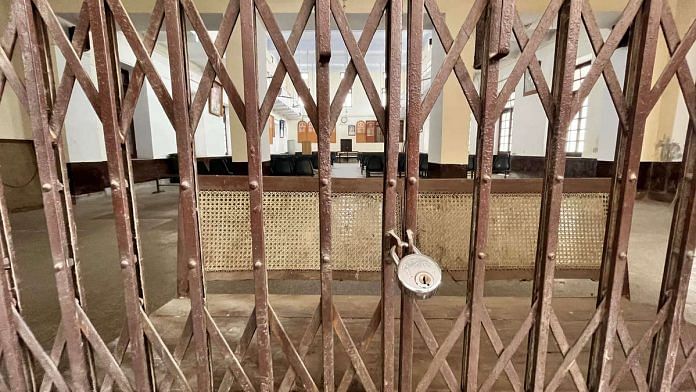Lucknow/Prayagraj: It is Day 564 of the indefinite strike. Around 20 students of Allahabad University are still shouting “Chhatra ekta zindabad“, “Chhatrasangh bahaal karo“— Long live student unity! Bring back the student union! — outside the deserted student union building.
Allahabad University has for long been the nursery of student politics, feeding young firebrand leaders to political parties for decades. But for several years, quite a few universities in Uttar Pradesh have not conducted student body elections, leading to unrest and festering grievances.
Allahabad University (AU) last had student elections in 2017, while Lucknow University (LU) and Banaras Hindu University (BHU) have not held them since 2006 and 1997 respectively, ostensibly to avoid the violent clashes and political party involvement that often accompanied campus polls.
Over the years, the national mood has turned against student politics, as is glaringly evident in UP. Dissenting voices on campuses are now being identified and tagged as “chihnit“, a popular term for those who are marked by the police, a hangover from the 2016 Delhi protests involving Jawaharlal Nehru University (JNU) scholars Kanhaiya Kumar and Umar Khalid, and the resulting pushback that included sedition charges.
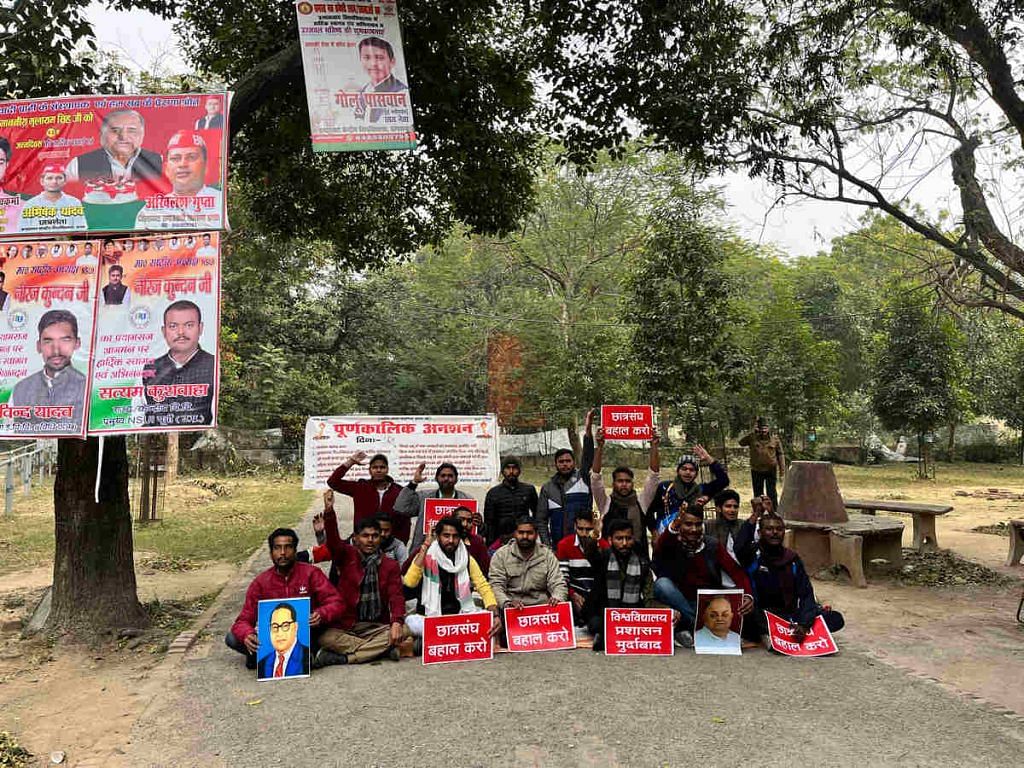
“We have done everything from detention, spending months in jail, facing brutal lathi-charge to writing letters to the authority with our blood,” Ajay Yadav Samrat, a 23-year-old LLM (Master of Laws) student, who has led the protest at Allahabad University, said. Holding up posters of B.R. Ambedkar and Janeshwar Mishra, the students shouted, “AU administration murdabad“, “Inqilab zindabad” — Down with Allahabad University administration! Long live the revolution!
Allahabad University is neither new to such strikes nor to the slogans. In 2019, it dissolved the student unions and replaced them with student councils — where the representatives are not directly selected.
Also Read: Marriage, money, maut — In Prayagraj’s ‘Kota’, students want exams as UP poll issue
Lathi-charge, jail, and FIRs for student leaders
Allahabad University, a formidable talent pool for leaders, gave India three prime ministers (Gulzarilal Nanda, V.P. Singh, and Chandrashekhar) and a former President (Shankar Dayal Sharma). Banaras Hindu University (BHU) was the alma mater of BJP’s Manoj Sinha, Mahendra Nath Pandey, Bhola Paswan Shastri, and Sharat Chandra Sinha, among others. Several of Lucknow University’s former student leaders are now politicians in major parties, such as BJP’s Brajesh Pathak and Samajwadi Party’s Arvind Singh ‘Gope’.
For many first-generation students from the hinterland, campus politics is a gateway into a much larger world of ideas and exposure. From preparing protest materials and cooking up catchy slogans, to keeping abreast of national and international developments and honing debating and oratory skills, a stint in campus politics can be a personality-booster and confidence-builder for many.
Student politics has been the stuff of Bollywood movies from the times of Mere Apne (1971) to more recently Haasil (2003) and Gulaal (2009). But much of the sway and swagger associated with student leaders has ebbed. In the popular consciousness now, campus politics and activism are associated with violence, neglect of studies and career, and anti-government mobilisation.
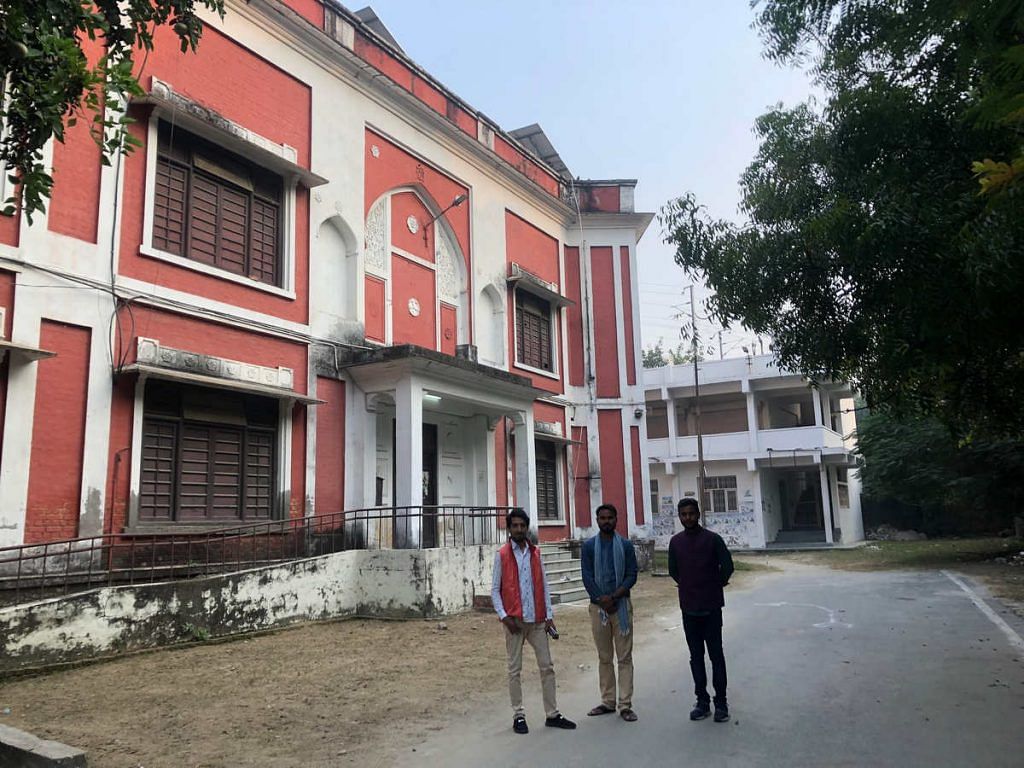
“Earlier, a student leader or union president could slow down the speed of a city. They could bring out thousands of people with just one call,” Abhishek Dwivedi, a National Students Union of India (NSUI) leader in the protesting group, said. “And today you cannot go and offer a garland at Bhagat Singh’s anniversary without 20 police officials being deployed there to stop you. There are dozens of FIRs against youth leaders in Karnalganj thana (police station). It is the same story in BHU and Lucknow campuses too.”
The protesting students in Allahabad are now mobilising support through WhatsApp groups, Facebook accounts, and Twitter trends, until the university reopens.
In other universities and colleges in UP, too, there are similar small-scale protests, marches, signature campaigns, and social media drives.
There have been a handful of ‘big moments’ in recent years, but they have only led to clampdowns.
For instance, in 2017, a mob of angry students in Lucknow University waved black flags before Chief Minister Yogi Adityanath who was there for an event. The police detained many of them and LU later denied admission to several students who were involved in the protest.
A year before that, a student called Ashutosh Singh in BHU shouted out to Prime Minister Narendra Modi at the end of an address. Singh had asked when student body elections would be held, and for this he was reportedly attacked by BJP workers.
Protests still occasionally take place outside the chambers of university vice-chancellors, but they haven’t made any serious impact. The lack of elections has led to a gap between students, faculty, and the administration. “There is a rise in youth unrest and our grievances go unaddressed,” Sadaf Tasneem, an NSUI member from Lucknow University, said.
“We have not been able to hold big protests against the NEP (National Education Policy), railway jobs, online exams, increase in fees, and so on. As they say, jis aur jawani chalti hai us aur zamana chalta hai (where the youth goes, our world goes). Now the zamana (world) is also not agitated over these issues because our youth have been deprived of campus politics,” Sadaf said.
Last December, even Chief Justice of India, N.V. Ramana remarked on the political vacuum in campuses. “Any keen observer of Indian society would notice that in the past few decades no big leader has emerged from the student community,” he said at a convocation at the National Law University in Delhi.
With the neutering of campus politics, political parties haven’t found many firebrand student leaders to groom either, with the exception of Kanhaiya Kumar and, more recently, Pooja Shukla —one of the black-flag protestors at Lucknow University — who is contesting the assembly polls on a Samajwadi Party ticket.
मेरी हिम्मत ,हौसला और आदर्श आदरणीय राष्ट्रीय अध्यक्ष श्री @yadavakhilesh जी का आशीर्वाद प्राप्त हुआ।
मुझ जैसे साधारण कार्यकर्ता को इतना सम्मान देने के लिये जीवनपर्यन्त आपका आभार।
— Samajwadi Pooja shukla (@poojashukla04) April 1, 2021
Hemant Tiwari, a senior journalist based in Lucknow, said that there was a time when political leaders regularly gave election tickets to student leaders, but that is no longer the case. “The money element is now more important than the agitation element,” Tiwari said, adding that criminals, religious fringe leaders, and contractors were now more likely to contest polls.
At the Allahabad University campus, the yellow-walled student union building wears a deserted look. The main gate is locked and the nearby tea shop is also shut. But once it was buzzing with activity and the urgent self-importance of students.
“Debates used to be organised in the hall, leaders made strategies for protests, students used to come with their grievances… over a cup of tea, students formed solidarity groups,” Ajay Yadav recalled.
Two-hundred kilometres from this protest site, the student union building at Lucknow University is no different. Doors are broken, wall paint has faded away, and the inside of the building is full of spider webs.
“This building is occasionally used for shraddhanjali (ceremonies) and for visits of political leaders. That’s it,” Kartik Pandey, a university student and a member of the SP’s youth wing, Samajwadi Chhatrasabha, said.
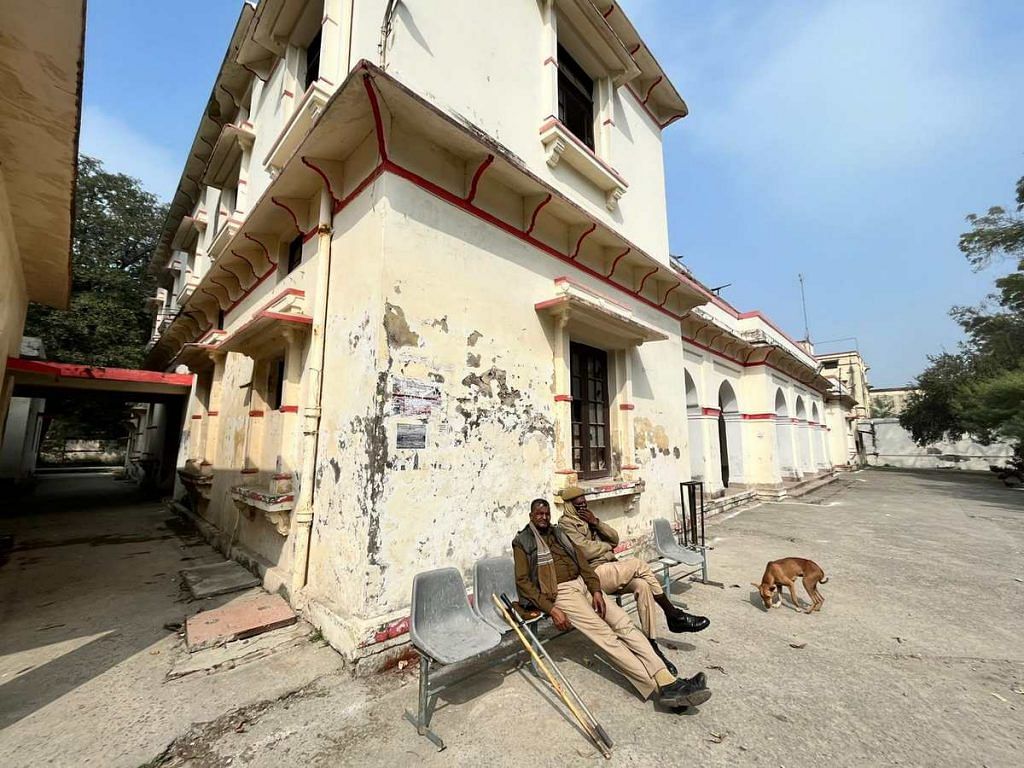
At both campuses, members of the NSUI, which is the students’ wing of the Congress, and Samajwadi Chhatrasabha claim that there is no participation in protests from the Akhil Bharatiya Vidyarthi Parishad (ABVP), a student body that is affiliated to the RSS.
“You will never see them joining hands with us. Their political activities are limited to receiving leaders at the party office and offering garlands on Shaheed Diwas,” Allahabad University’s Dwivedi said.
The ABVP, however, continues to give a steady supply of young leaders to the BJP. In recent years, its clout has grown in universities across India. In 2020, it claimed to have more than 33 lakh members.
The ABVP’s position seems to be that protests are generally unnecessary.
While the SP and Congress both rely on their youth cadres for major agitations and campaigns across campuses and districts, the BJP and BSP are not directly affected by the curb on student politics.
In the absence of the elections, and with the pandemic, students are no longer engaging with global issues like Palestine and ‘neo-liberal’ economics. Their focus is now restricted to issues such as hostel mess, libraries, fees, and online and offline exams.
While both NSUI and Chhatrasabha leaders said they had planned huge protests against the new education policy and unemployment, these never materialised.
Also Read: Unemployment and unlimited data pack — UP’s youth are neither angry nor idle
Goondas and an age limit — the decline starts
The beginning of the downfall of campus politics was a 2006 report of the Supreme Court-appointed Lyngdoh Committee, according to many students, professors, VCs, and political leaders. But, the reason the committee came into existence was because of serious violence and irregularities in campus politics.
The purpose of the committee, which was formed in 2005, was to set guidelines for the conduct of student elections. These included establishing stringent eligibility criteria for candidates, such as an age limit in order to counter the problem of some ‘students’ sticking around in universities well into middle-age to fight elections under the sponsorship of political parties.
A senior police official in UP, who did campus duty in the early years of his career, had several examples of the decades-old rot in campus politics.
“Allahabad University has a history of electing union leaders above the age of 50 too. For example, in the 1970s, Jagdish Chandra Dixit became the president at an age of 52. Another candidate, Laxmi Shankar Ojha, was elected at the age of 52, around the same his daughter graduated from the university,” he said.
The police officer added that there was rampant lawlessness in student politics in the ’90s and early 2000s too.
“In 2004, a Lucknow university student leader Upendra Singh Manu was shot dead in a hostel. Another murder took place during a shootout in the nomination process that year too. It became a huge mess. Allahabad University hostels got involved in papers leaks, rowdy behaviour, using muscle power,” the officer said.
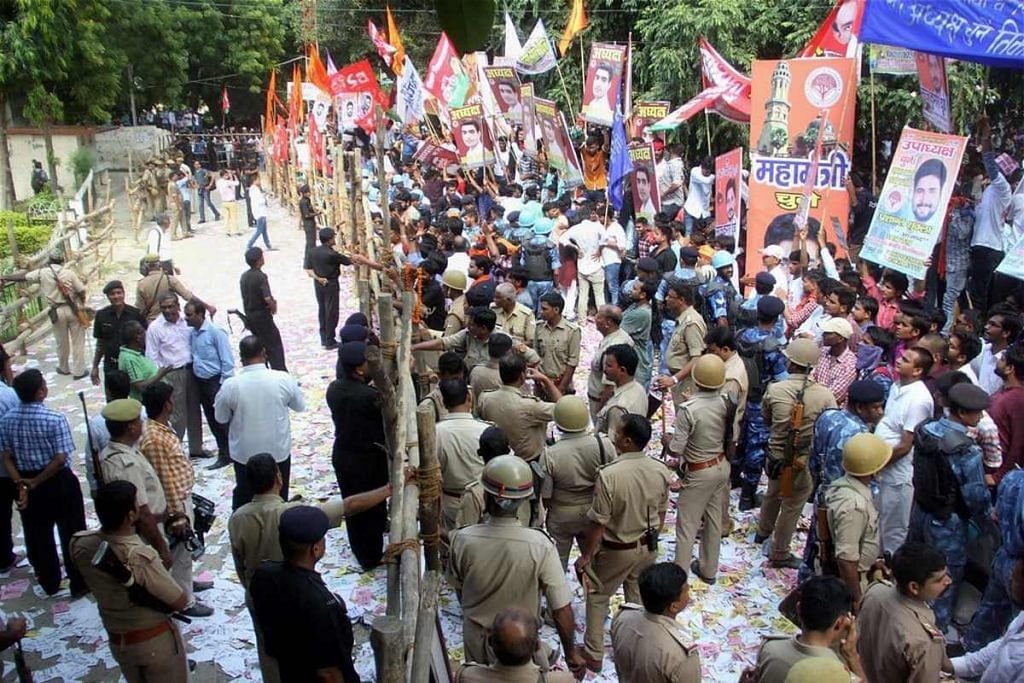
Ram Dutt Tripathi, a former BBC radio presenter, who has observed UP politics for 30 years, said that the entry of the “goonda element” in the ’90s gave student politics in general a bad reputation.
“[Student leaders] were no longer intellectually superior… rather, they had a big nuisance value. No one wants student politics now — be it parents or university or administration,” Tripathi said.
However, others argue that the Lyngdoh Committee’s rules were stiflingly restrictive and that even the earlier problems did not justify the ban on student elections.
Samajwadi Party leader and former minister Arvind Singh Gope, who is contesting the assembly elections from the Dariyabad seat in Barabanki, started his political career as the president of the Lucknow University student union.
Speaking to ThePrint, he said: “Corrupt politics have entered the Lok Sabha and assembly elections too — it doesn’t mean that we ban them.”
Academician Ramesh Dixit, who was a professor of political science at Lucknow University for more than three decades, said that he was well aware of the “decline” in student politics but still disagreed with the ban on union elections.
“I strongly believe that banning student elections is an attempt to deprive them of dialogue and protest,” he said.
‘Stop the count!’ Elections come to a halt
In the wake of large-scale violence between rival groups, BHU banned student elections in 1997, and in 2011 replaced the student union with a “student council”. Allahabad University followed the same path in 2019.
In the case of Lucknow University, things have been complex. In 2007, Mayawati’s Bahujan Samaj Party shut down student elections.
“That year, some clashes erupted during the nomination and the elections were cancelled. This was followed by protests and signature campaigns,” Samajwadi Chhatrasabha member Kartik Pandey said.
A year later, Mayawati said student elections would be allowed, but under the condition that Lyngdoh Committee guidelines would have to be followed.
It took another four years for elections to be announced again, in 2012. “The same story repeated and elections were cancelled [due to clashes]. In 2017, again, 125 students were sent to jail during nomination violence. It has been chaotic,” Pandey said.
According to the senior police officer quoted earlier, a heavy hand was sometimes necessary to deal with the strongmen of student politics and their unruly behaviour. Many of these leaders had connections high up in the political pecking order and were not afraid to flaunt it, he said.
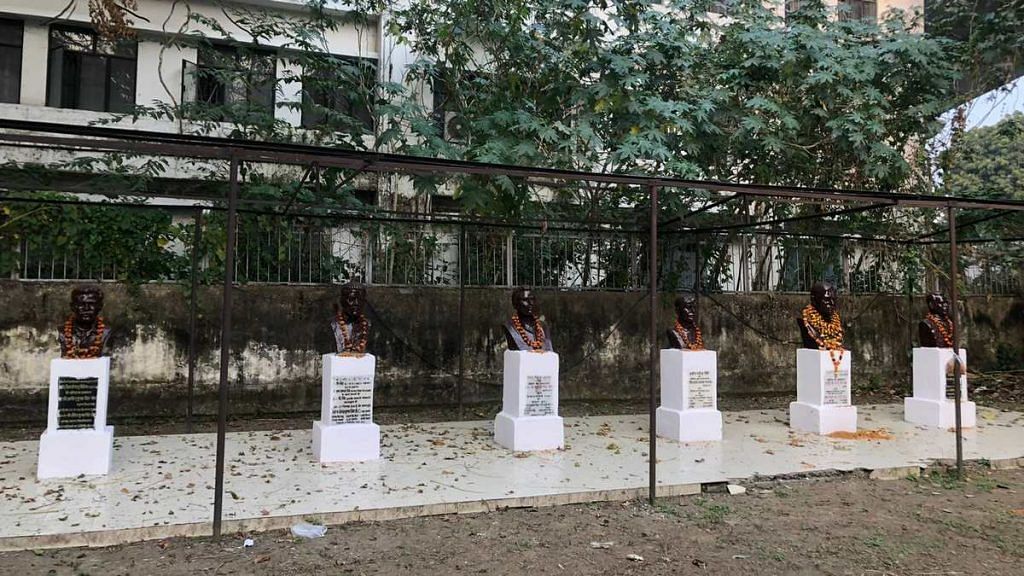
“During their big day ceremonies, the [student union] presidents would manage to get the chief minister in their guest list. The scene at the union halls used to be quite something. The student union president had more bhaukal (swagger) and muscle power than the local MLAs or MPs. The adhyakshji (union president) would walk into any restaurant and the manager would not ask him to pay the bill, ” the police officer said.
While members of the NSUI and Chhatrasabha acknowledged that there was truth to the claims about the toxic culture of student politics, they said that a ban wasn’t a solution.
“The university can regulate norms rather than ban elections,” NSUI leader Sadaf Tasneem said.
Also Read: Jobless teachers, Munnabhai cheating mafias, paper leaks: Inside UP’s ‘Chhota Vyapam’
New directions: IT cell, mainstream parties
With no real outlet for their political ambitions on campus, many students are experimenting with new ways of finding a voice in public life.
Some are trying to make an impact with online activism, a few are becoming members of mainstream parties, although others like Allahabad University’s Ajay Yadav still haven’t given up hope in old-school protest.
“In the absence of student politics, new power centres have emerged in the form of IT cell recruitments. The more you target your opponents on social media, the more your presence will be acknowledged,” Yadav said.
In Ayodhya, 19-year-old Ashish Singh, a student of Saket College, joined the Aam Aadmi Party (AAP) to get a foot in the political door. He makes the effort to sit at the party office, but his older colleagues often ignore him.
“Colleges are not functional, but I want to somehow break into this circle. What option did I have? The college doesn’t hold elections,” he said.
Indeed, students are often lectured about why they should avoid campus politics.
A former UP police officer, a product of Allahabad University and JNU himself, echoed a widely held view: “Is it their age to play politics or to study? Student elections are just a way of ruining campuses.”
Recently, a video went viral of Prayagraj (Allahabad) senior superintendent of police Ajay Kumar blaring advice from a mic to students protesting against alleged irregularities in the railway board recruitments.
In a rousing speech that was part threat and part pep talk, he told the students that they should steer clear of protests and believe their leaders. He also elaborated on his own CV and how sticking to his academic endeavours had worked out well for him.
A day after police crackdown on students involved in protest, Prayagraj SSP Ajay Kumar's pep talk to students advising them to stay clear of miscreants. An FIR has been registered against 3 named and 1000 unnamed people. Six cops have also been suspended. pic.twitter.com/svz6pwEhAI
— Piyush Rai (@Benarasiyaa) January 26, 2022
No one at the protest seemed very convinced.
Mukesh Yadav, an MSc in mathematics and a university topper said that there was no contradiction between doing well in academics and participating in agitations.
“I spend my days at the protest site and top the university too,” he said.


